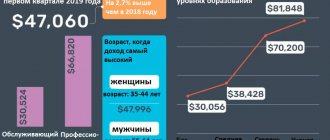Salary in Denmark and Greenland in 2021: average, minimum
In 2021, the capital of the Kingdom of Denmark, Copenhagen, was voted the best European city to live in. Despite the small size of the state itself, the level of its economic development is quite high, which provides the country’s residents with decent living conditions. This includes high-quality medical care, an accessible education system, and social support from the state. But, since we are accustomed to classifying countries according to the level of income of citizens, it will be interesting to know what salaries in Denmark are paid in different sectors of the economy against the backdrop of all this prosperity.
Features of salary payment
The state we are studying can be called specific in terms of the relationship between employee and employer. The first thing that sets it apart from other countries in Europe is the absence of a unified labor code that would establish general standards of interaction in the labor market.
All aspects of labor legislation are specified in the agreement, which is concluded between representatives of the employing company and the Danish Federation of Trade Unions. In particular, the document regulates the following aspects:
- work time;
- working hours;
- salary;
- vacation;
- the minimum age at which employees retire;
- the time frame within which employees must be notified of the termination of the employment contract;
- minimum wage limit;
- overtime pay and others.
Thus, we can say that all working conditions, including salary, in Denmark are prescribed individually in each contract, and are not subject to any general laws that apply to the entire country.
It is worth noting that trade union organizations in the Kingdom have quite a strong influence. This is due to the fact that they include approximately 85% of all citizens. As for the part of the contract that determines the employee’s salary, it is reviewed every 2 years.
Salaries by profession and industry
The maximum salary in Denmark is received by dentists working in municipal clinics; they earn before taxes about 13 thousand euros (almost 942 thousand rubles). As throughout the world, the highest earnings were recorded among financiers, representatives of insurance companies, and energy workers. Here is the average salary in Denmark for different specialists:
- head of the company - 13,400 euros;
- doctors – 9,400;
- police officer - 8,510;
- pharmacist – 8,400;
- teacher (secondary school) – 7,600;
- kindergarten teacher – 7,200;
- builder – 5,400;
- driver – 4,700;
- seller in a supermarket or retail store – 3,400;
- cleaner, worker – 2,800.
As you can see, profession is very important in determining average earnings. It is interesting that employees of municipal enterprises receive more than employees of private companies. Therefore, it is difficult to get a job there.
The difference in income between representatives of prestigious professions and middle-class specialists is only 3 times. This is due to the use of a progressive tax in the country: individuals must give the state from 8 to 56% of their earnings. In this case, the rate depends on the level of monthly income - the higher your earnings, the higher the percentage of deductions. Employees are required to make their own contributions.
Income tax consists of contributions:
- state – from 8 to 56.43%;
- municipal up to 29% depending on the district;
- church (it is obligatory to pay it only to parishioners of the Lutheran Church) – 1%.
The established tax percentage depends on the amount of income for the year. Additionally, employees make contributions:
- to employment centers – 8%;
- for medical care from 5 to 15%;
- for profit from dividends (if received) – 30%.
It is also worth remembering that high wages have led to the fact that prices for goods and services in the country have also increased. Due to contributions to employment centers, people who have lost their job within 2 years are paid a benefit in the amount of 90% of average earnings. But there is one condition - during this time the person must find a job. This is what many people do to ensure a higher standard of living.
Minimum wage
The Danish kingdom is on a par with Sweden and Luxembourg in terms of wages. This suggests that the incomes of citizens exceed the average threshold and are considered high compared to other countries in the European part of the continent. But we should not forget that taxes and prices here cannot be called low either.
As for the minimum wage limit, it is not officially fixed at the state level. As mentioned above, the salary is stipulated in the collective agreement, which is signed upon employment at a particular enterprise.
The amount of the rate can be influenced by all sorts of factors, from the age of the employee to his qualifications. The minimum wage in Denmark in 2021 is 14.5 euros per hour (approximately 108 DKK), excluding pension benefits and taxes.
If we consider a 6-hour working day with a five-day working week, it turns out that the minimum you can earn in Denmark per month is 1,740 euros (about 13 thousand crowns).
The area of employment must also be taken into account. As in any other country, there is a list of the most in-demand professions that are paid an order of magnitude higher than other professions.
The so-called shortage professions include:
- IT technology developers;
- engineers in the field of construction and energy;
- medical workers, including veterinarians, nurses, dentists;
- primary and secondary school teachers;
- social workers;
- pharmacists;
- legal consultants and auditors.
Workers who are willing to work in the service sector are no less in demand. The wages here are lower than for highly qualified specialists. But those who have good experience can also succeed. For example, the minimum salary for a sushi chef in Denmark is 1,500 euros (11,142 kroner).
Maximum salary
If you are interested in the question of what the salary is in Denmark, you probably want to know what salary is the ultimate dream of every Danish employee, and which lucky people receive it.
Dentists receive the highest salaries
There is no labor code in Denmark and there are no fixed rates. It is known that the highest income in the kingdom belongs to What does a dental technician do, and how much do they pay for this? Dentists working in the municipal sector - their salary can reach 13,000 euros per month (gross). Programmers, IT specialists, and engineers receive decent pay for their work.
Average salary level
To begin with, let us remind you that the work of the Danes takes less time than that of a Ukrainian, Russian or any other representative of the post-Soviet space. On average, a working day lasts no more than 6-6.5 hours. And the vacation that every employee can count on is provided for at least 6 weeks. This means that every resident of the country has 16 hours a day that he can devote to himself, rest and his family.
The average salary in euros in Denmark in 2021 is 2,500-2,600 euros per month (18,500-19,300 kroner). This is quite enough to lead a normal life. This income is typical for most of the country's residents.
For comparison, we present the data in the table:
| Speciality | Payment in euros | Payment in crowns |
| Doctor | 5 000-5 200 | 37 000-38 500 |
| Nursing staff | 2500 | 18500 |
| Driver | 2000 | 14800 |
| Secretary | 3 500-3 700 | 26 000-27 500 |
| Manager | 2000 | 14800 |
| Cashier | 1900 | 14100 |
| IT specialist | 3 500-4 000 | 26 000-29 700 |
From this we can conclude that the average salary in Denmark largely depends on the field in which a particular employee is involved.
It is important to note that, like most countries in the world, Denmark actively welcomes the influx of specialists in the scientific field. For this purpose, various grant programs are being developed that allow scientific activities not only at the state level, but also in private companies. The salary, for example, of a postdoc in Denmark who has just completed graduate school does not exceed 2,000 euros (14,800 crowns), but those who have already achieved certain success in science can count on a salary of 2,500 euros (18,500 crowns).
Average earnings on the island of Greenland
The administrative unit of the Kingdom of Denmark, located northeast of the United States, is of great interest to foreign migrants. The island of Greenland is unique in that most of its territory is covered with ice. For this reason, the island's population was mostly concentrated on the southwest coast.
To understand the average salary in Greenland in 2021, you need to take a short look at the local labor market. Since the majority of the population is involved in the procurement of sheep and bull meat, as well as in industries such as hunting and fishing, it is safe to say that vacancies are most often offered in these areas.
There is a great demand on the island for those who speak the local dialect. It should be borne in mind that 85% of the population are Eskimos, and only 15% are Danes and migrants themselves. Don’t forget that payroll taxes are also considered high. Here you will have to pay 40 to 65% of your income to the state fund, based on the total annual profit.
Salaries in Greenland are not much higher than in Denmark itself:
| Profession | Payment in euros | Payment in crowns |
| Meat deboner | 1800-2000 | 13500-15000 |
| Chief engineer | 2000-3000 | 14500-22300 |
| Turner-motorist | 2000-2100 | 15000-15600 |
| IT developer | 2000-9000 | 15000-70000 |
| Instructor at a meat processing plant | 25000 | 18500 |
| Handyman | 1800 | 13500 |
Average salary in Denmark in 2021
Statistics Denmark provides the following figures: the average gross salary is 38,854 kroner per month, which is equivalent to 5,202 euros (371,952 rubles). The average salary in Denmark after taxes and mandatory social contributions is about 3,100 euros (221,687 rubles).
In other Scandinavian countries, average incomes are lower. Salary in Sweden is 38,247.5 kroner (3,506 euros, 250,096 rubles) per month before taxes, in Norway - 46,130 kroner (4,588 euros, 327,287 rubles). Such data is published by local statistical offices. In terms of income, only Luxembourg is ahead of Denmark with an average salary of 5,280 euros (376,529 rubles).
According to the Bureau of Labor Statistics, the average salary in the United States is $3,920 per month before taxes. The amount is equivalent to 3,569 euros, or 254,521 rubles. In Denmark, the average salary in 2021 is 25% higher than in the United States.
The comparison with Russia is much gloomier: the average monthly salary in the Russian Federation is 43,400 rubles, or 608 euros. This is 8.5 times less than in Denmark. However, the cost of living in Russia is not comparable to prices in Copenhagen or even in small provincial towns in this country.
Average salary in Copenhagen
According to the international website Numbeo, a database of cities and countries around the world, the average salary in Copenhagen reaches 3,000 US dollars net (2,730 euros, 194,867 rubles).
They earn approximately the same in Roskilde, the former residence of the royal family of Denmark (now it is a transport hub, which is closely economically connected with the capital), as well as in Odense, a commercial and industrial city (the headquarters of most large companies are located here).
Denmark is a monarchy. Traditionally, the opening of the Folketing (parliament) is attended by Queen Margrethe II and Crown Prince Frederik
On the relationship between the population's income and the salaries of deputies. In Denmark, parliamentarians receive 7,835 euros (559,497 rubles). The salary of deputies is 1.3 times the average salary in the country - this is the lowest ratio in European countries. The income of Russian deputies is 23 times higher than the average salary in the Russian Federation.
How much do residents of small towns and regions earn in Denmark?
Denmark is geographically divided into five regions. They earn the most in the capital Hovedstaden - 15% more than in the provinces.
Average salaries by region before taxes:
| Region | Average monthly income, in euros | Average monthly income, in rubles |
| Hovedstaden | 5950 | 424 408 |
| Northern Jutland | 5600 | 399 392 |
| Southern Denmark | 4750 | 338 770 |
| Central Jutland | 4380 | 312 381 |
| Zealand | 3900 | 278 148 |
By city, employees are paid the least in Esbjerg - 2,330 euros (166,162 rubles). It is a port city where people work in the shipbuilding, fishing and oil industries.
Danish shipbuilders earn average salaries
The income of the population is also low in Aalborg - 3,260 euros, or 232,472 rubles. Aalborg produces steam boilers, alcohol, and has a developed telecommunications industry.
Underemployment
When looking for a job in the Kingdom, it is important to remember that the easiest way to find it is in those areas that are not in demand among Danes. It must be said that local residents do not consider the level of wages in their country to be high, and therefore are more willing to go to neighboring Norway to work. Moreover, the population of Denmark is so picky that they leave all the so-called menial work for foreigners arriving here.
These types of work include the social sphere, services, and work on farms. Most often, these types of work are seasonal, which suits migrants and those looking for part-time work quite well.
So, say, work in greenhouses and on farms where animals and crops are raised is usually paid hourly - from 10 euros for each hour worked (74 crowns). Some people prefer to pay according to the quantity harvested, for example 1 euro per 1 kg (7.43 CZK).
But to get a job with a flexible schedule in a hotel or restaurant, you will have to learn Danish or English. If you manage to find some part-time work in an office, then you will need knowledge of two languages at once.
Average earnings in Denmark and how they have changed since 2018
By the beginning of 2021, the average salary level in the country reached 5,230 euros. The salary level in this country is one of the highest in Scandinavia. Interestingly, social workers received the maximum salary increase. In this case, it does not matter at all which municipality their organization belongs to.
After paying taxes, employees have an average of 3,270 euros (in terms of rubles - 236,800). At the same time, men earn more than women. In 2021, after taxes, the average salary for women was 2,960 euros; now earnings are about 10% more. At the same time, representatives of the stronger sex received a balance of 3,430 euros.
Since there are no uniform tariffs in the country, the salary level will depend on the individual agreement. It stipulates the conditions:
- length of the working week and day;
- minimum wage, pay per hour spent at work, overtime allowances and bonuses;
- the duration of the contract and the conditions for its extension or termination;
- procedure for granting leave;
- retirement age.
Salaries are reviewed at least once every 2 years. This is due to the activities of trade unions, which include 85% of citizens. The local population begins to work before the age of 18, combining their work with training, so by the age of 30 people have experience and can receive an average salary or even higher, depending on the specialty they acquired during training.
Unpaid work
Various types of internships for students are very popular in Denmark. Most often, this type of employment does not involve payment. It is believed that students, as a reward for their work, receive invaluable experience that will help them subsequently find a decent job.
Internship places usually provide:
- oil and energy companies;
- agricultural farms;
- enterprises of the mechanical engineering industry;
- research centers;
- museums;
- institutes specializing in archaeology, art history and architecture.
All programs are financed by the state. Trainees are subject to certain requirements: 18-35 years old, have an appropriate diploma received no later than 18 months before employment. In many cases, knowledge of Danish, Norwegian, German, Swedish or English is also required.
The duration of the internship ranges from 6 to 18 months. If the interns' work is unpaid, the applicant will need to demonstrate their financial viability.
In most cases, after completing such work experience, many interns remain working in the company where they gained the experience they needed.
Average salaries of in-demand professions for foreigners
Many migrants from Eastern Europe would like to come to Denmark, get a job and receive high salaries. But despite the vibrant and active labor market in the Kingdom, job applicants must understand that they will not only be required to have relevant qualifications and experience, but also knowledge of the local language.
The exception is for narrow specialists who have in-demand professions. They may well count on lucrative offers from employers, and replace the Danish language with English. All other representatives of Eastern Europe will have to be content with simpler and less paid positions.
Without knowing the language, you can get a modest salary in the service sector:
- Maids;
- Scavengers;
- Cleaners;
- Gardeners;
- Waiters;
- Bartenders;
- Middle and junior medical personnel.
Willingly hire:
- Builders of various specialties: masons, welders, painters;
- Drivers;
- Truckers;
- Seasonal workers for farms and greenhouses;
- Harvesters.
Expert opinion
Roshchina Christina
Women are happy to get jobs on mink farms. Caring for animals is well paid in Denmark. You can count on a salary of 2-3 thousand euros per month.
Jobs awaiting men as workers in the fields. They have to pick vegetables, berries, and fruits. This type of work does not require knowledge of the language.
A modest vocabulary is quite enough to get the task for the day. The average salary on farms is approximately 11 euros per hour.
Danish citizens do not seek employment in positions that require physical work for a low salary. Therefore, foreign migrants are waiting for places in the hotel business, catering establishments, tourism, construction, and agriculture.
Income tax
Denmark is a country with one of the highest tax levels. More precisely, half of the country’s state budget is formed precisely from revenues from collected fees and duties. But at the same time, the quality of life of the Danes remains at a consistently high level, and they themselves do not complain about such high taxes; moreover, they are conscientious taxpayers.
The contributions that Danes pay from their income consist of several parts: regional, municipal, state, church, and employment fund fees.
Moreover, all payments are made from the wages of employees. The employer does not owe the state anything in this regard.
The amount of tax directly depends on how much an employee earns. The basic rate is 6.83% if the annual income does not exceed CZK 40,800 (EUR 5,500). Further gradation of tax payments on income involves 15, 17 and 42%, depending on the total annual financial growth.
Church income tax here is voluntary, amounts to 1% of salary and applies only to those who belong to the Lutheran Church. As for the distribution of tax contributions, almost 30% of them end up in the country's municipalities.
Income tax is not the only one in this country.
Standard of living for immigrants in Denmark
The countries of the Scandinavian Peninsula pay great attention to the problems of social support of the population. Denmark was no exception in this regard. It ranks fourth in the world in terms of the standard of living of its citizens. Denmark maintains its leading position due to:
- Steadily growing economy;
- Preservation of historical traditions;
- Reasonable policy of social protection of the population;
- High salaries;
- Good ecology;
- Advanced Medicine;
- Quality education.
All these indicators easily add up to a formula for happiness for Danish citizens. And they use it throughout their lives, the average duration of which today is 75 years for men and 80 years for women.
Denmark's growing economy is leading to technological innovation in all economic sectors. The oil industry, mechanical engineering, and wireless telecommunications are actively developing. The labor market in the Kingdom is very active. It is not surprising that total employment of the population exceeds 66%, and the average unemployment rate is recorded at only 3.7%.
The living wage in Denmark is about 1300-1500 euros per month. Its size can vary significantly depending on the region of residence and the average salary level in a particular municipality.
Populations with low wages receive serious financial assistance from the state. Moreover, migrants have the same right to it as native residents. If a person loses his job or is initially unable to find a job, he is entitled to a subsidy of 1,400 euros per month.
Such conditions stimulate immigration from Eastern Europe, Asia and Africa. Some visitors abuse their right and live in Denmark for a long time on benefits, without even trying to get a job.
In addition to high salaries and benefits, migrants are attracted by the safety that reigns in Denmark, the tolerance of citizens, the absence of corruption and excellent prerequisites for running a private business.
Employment methods
There may be several options for finding a job in the Kingdom of Denmark:
- independently - through friends, social networks, on specialized websites, on the website of the Danish Employment Center;
- with the help of intermediaries, using the services of specialized agencies.
The portals of the companies themselves should not be neglected. To do this, however, you will have to learn the local language. Although, if you are looking for a well-paid job, this requirement will in any case be on the list of mandatory ones.
As for intermediaries, use the services only of those who have already earned a certain reputation, because the chances of falling into the hands of scammers are high.
Actively subscribe to various forums and groups on social networks. In them you can not only find a job, but also get useful advice regarding employment and life in the country.
Salary per month by profession
The highest paid professions in Denmark are dentist and actuary (a specialist in actuarial calculations in the insurance and investment business). Their average income is 6,700 euros per month after paying all taxes.
Of the qualified specialists, designers, archaeologists and literary scholars earn the least. Their average income is just over 2,000 euros per month.
| doctor | 5490 |
| nanny | 1500 |
| guide | 1500 |
| housemaid | 1640 |
| teacher | 4200 |
| engineer | 4450 |
| nurse | 2430 |
| welder | 2790 |
| programmer | 4520 |
| electrician | 2800 |
| police officer | 4650 |
| worker | 1900 |
| salesman | 2760 |
| firefighter | 3900 |
| driver | 2230 |
| lawyer | 4870 |
| driver | 3700 |
| accountant | 2300 |
| builder | 2155 |
| loader | 1300 |
| dentist | 5620 |
| taxi driver | 2060 |
As in other European countries, in Denmark unskilled labor is paid lower than the work of specialists with higher education. But some professions, which most people classify as unskilled labor, are quite highly valued in the Kingdom of Denmark. Thus, a garbage collector is equivalent to a law enforcement representative and receives up to 2,200 euros per month.
Minimum wage
Unlike other economically developed countries, in Denmark the state practically does not interfere in labor relations. Therefore, there is no official minimum wage in the kingdom.
Minimum wage
The state of the country practically does not interfere in the labor relations of employer and employee. In this regard, it is difficult to determine what is considered the minimum salary. At least there is no officially established figure. It all depends on the specifics of the work and personal agreements between the director and employee.
There is no need to fear that the company is violating employee rights. Professional relations are supervised by trade unions, which cover 80–90% of the staff. Salary often depends on specialty, skills, work experience, etc. Both hourly and monthly payments are acceptable.
Payment with new money
Now almost the whole world knows about unusual digital money called cryptocurrency. Bitcoin is not issued by national central banks and is now valued higher than all currencies in the world. There is now an ice arena in Härsholm under this name. This year, Danish national hockey player Nikolai Rosenthal will be paid in bitcoin, but the contract also specifies hard government currency in case the cryptocurrency falls in price. Many believe that this money has a great future, and so far they justify this opinion.
Attention! Within our portal, you can get advice from a corporate lawyer completely free of charge. To do this, simply leave a question in the form below. Contact us!
Minimum wage
Unlike other economically developed countries, the Danish state practically does not interfere in labor relations. Therefore, the concept of an official minimum wage does not exist in the kingdom.
Intervention by government agencies in the operating principles of large and small enterprises is kept to a minimum, that is, aspects such as the mandatory conclusion of an employment contract, the provision of vacations in principle and normalized working hours are stipulated in the collective agreement concluded at the time of employment.
The minimum wage in Denmark is about 14 euros per hour
The minimum wage level is set by trade unions and employers. The salary level depends on the region, the complexity of the work, the age of the employee, his experience and qualifications. According to statistics, the minimum wage in Denmark is about 14.5 euros per hour before taxes. If you work 37.5 hours a week - 2,175 euros per month.











